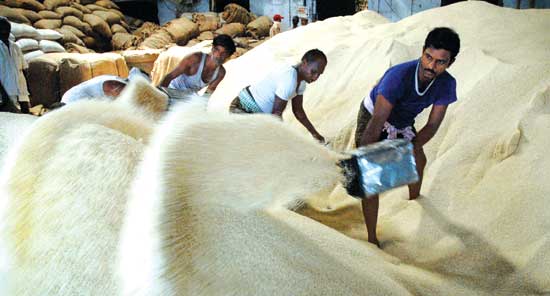HARYANA HAS emerged as the hub of premium quality basmati rice in the country, accounting for as much as 40 percent of exports. Sushil Jain, president of Rice Export Association, Haryana, says, “Exports from Haryana have nearly doubled in the past two years. The value of the rice produced last year was close to 8,000 crore.”
Among the districts, Karnal alone accounts for 50 percent of Haryana’s exports, which is an impressive 4,000 crore.
But barely 150 km away, let alone biryani, plain rice is what families are waiting for. Thanks to the government’s public distribution system, or fair price shops (FPS), where the rice always comes “tomorrow”.
Arusha Khan, wife of a daily-wage labourer and mother of three, has heard one thing about rice at her neighbourhood shops in Dharampura, Najafgarh in the national capital — “it is more expensive than wheat and scarce”. The shops open once or twice a month, at a pre-determined date each for the APL (above poverty line) and BPL (below poverty line) families. This when they are supposed to be open six days a week.
Arusha says many a time she has returned empty-handed. “They hardly ever give us rice. I get 15 kg of wheat and just 5 kg of rice every month. Since my husband doesn’t have a steady income and the supplies from the ration shop are irregular, I always worry about where my next meal is going to come from. Sometimes we have to buy 10 kg of rice additionally every month from the market,” she says, adding that most of the public distribution system foodgrain is sold off to small-time local shopkeepers.
“If we could just get what we are entitled to, I would be much less burdened,” she says.
Arusha’s family, originally from Bihar, doesn’t see much of a future for her children in the national capital. “Do we feed ourselves or give them an education? We can’t afford both.”
On reaching the public distribution system field office in Dharampura, TEHELKA found just 25 kg of rice in stock for a population of around 12,000. The ration shop owner downed the shutters and fled, apparently on being told that some journalists were enquiring about his shop.
Arusha’s neighbour Sabina Khan, who belongs to a family of 14, says she isn’t surprised. Her father, a daily-wage labourer, has a BPL card but that counts for nothing.
“We are supposed to get 10 kg of rice and 25 kg of wheat each month, but we haven’t received rice for the past two months. We always end up buying about 25 kg rice from the market every month,” she says.
“The fair price shop owner keeps saying, ‘Agle mahine de doonga (I will give you next month),’ but that never happens. His excuse always is, ‘Humare paas nahi hai toh aap ko kahaan se doonga? (If we don’t have the grain, how can we supply it?)’ Relying on the ration shop would mean starvation for us,” says Sabina.






Leave a reply